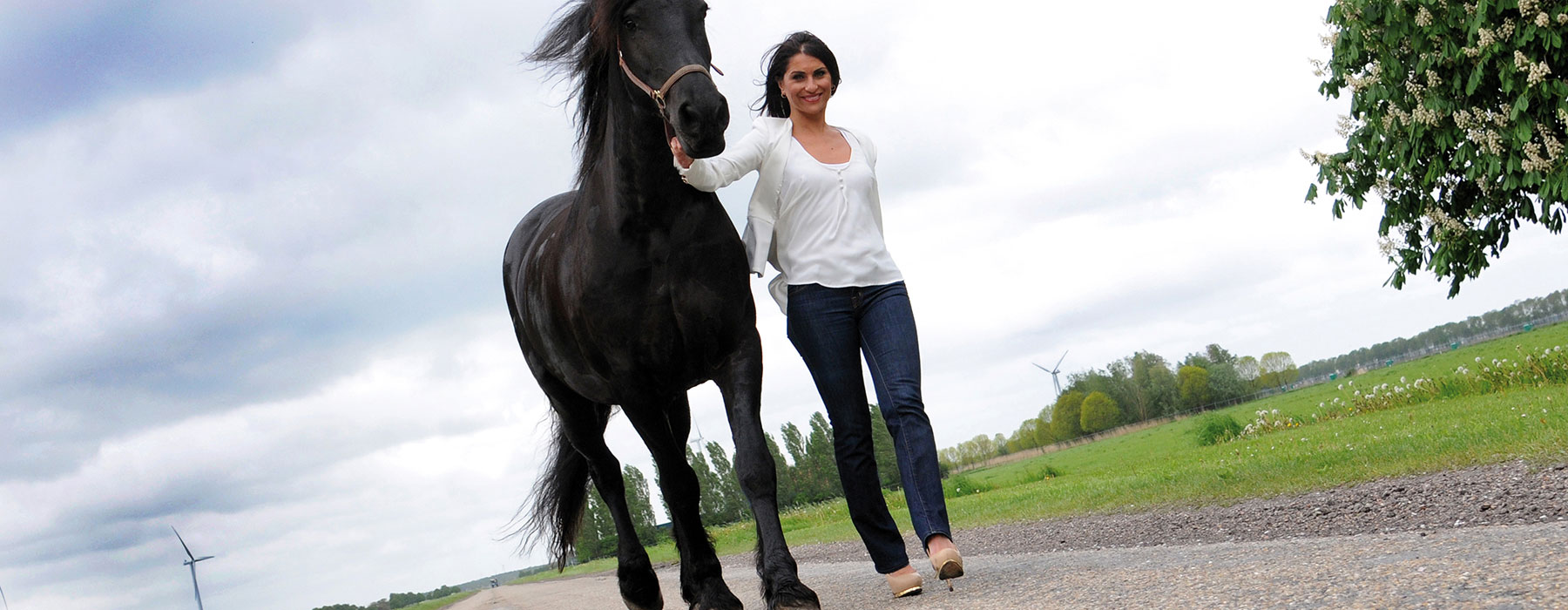NAME: MERAL HALACELI
COMPANY: MUFIDE
IN THE NETHERLANDS SINCE: BIRTH
Meral Halaceli sets the bar just a little higher than average in everything she does. This started in primary school, where she and her sister were the only Turkish girls. After studying communication management and science Meral was employed by a large multinational, but after two years she developed a need to start her own business. She was attracted by the challenge of managing a business according to her own ideas and by the responsibility and freedom that went with that. In 2007 she left for New York to gather inspiration and, a year later, started her own City Spa in Enschede – Müfide Hair & Spa. For commercial reasons she decided to use her mother’s name, who had by then run her own, successful hairdressing salon for 24 years – Müfide Hair & Art, in Hengelo. Although businesses in Turkey are more hierarchical than in The Netherlands, Meral works closely with her employees. Her motto is: ‘A good leader creates new leaders, not followers.’
1. How long have you been in The Netherlands?
My parents came to The Netherlands in 1976. They settled in Hengelo, where I was born in 1980. In the crisis years of the late seventies and early eighties, when they both ended up out of work, my father encouraged my mother to start her own business. He stayed at home with the children, which was an unusual situation for a man at that time. My mother started her own hairdressing salon, which was a big success. She did the right things at the right time, because she had a good feel for PR and knew how to profile herself. My father was a tower of strength for the family in difficult times; the ‘silent partner’ in the business, as it were.
2. How did you become an entrepreneur and why?
During my many travels I had discovered the City Spas in big cities. It seemed like a challenge to set up a City Spa in my own area. I went to New York in 2007 to gather inspiration, and that was the start of a creative process. I wrote a business plan and the bank cooperated, thanks to my mother’s healthy and successful business. I differentiate myself by operating a sustainable business and work exclusively with products that consist of at least 98% natural ingredients and are manufactured in an environmentally friendly way. Last year, together with my mother, I started the Müfide Hair Academy, where stylists are trained at the highest level in the fields of fashion shows, communication, make-up, photography and salon practice.
3. Did you encounter problems when you wanted to become an entrepreneur?
I’ve always been a go-getter. My parents gave me a lot of freedom, which allowed me to develop myself fully. They stimulated me to travel and gather work and life experience abroad. This is the most valuable thing I’ve inherited from them, because it makes me feel like a real citizen of the world. I have taken the best from both cultures and I can identify with several cultures. I am enormously proud of that!
4. What are the differences between doing business in The Netherlands and in Turkey?
Turks attach great importance to norms and values; there is a lot more respect for parents and grandparents. Turkish entrepreneurs work hard to give their children a good life. They are less dependent on banks because they get financial and moral support from their families. My parents have always supported family members financially, without asking anything in return, because they consider it as a gift. In Turkey there are already far more women in senior positions in business than in The Netherlands, thanks to the support of their families. The family looks after the children, so the choice between career and family arises less. In The Netherlands the ‘market value’ of a woman decreases immediately when she becomes a mother. In this regard, women are less emancipated in The Netherlands.
5. What is typically Dutch when it comes to doing business and being an entrepreneur?
The Dutch are more cautious and frequently wait to see which way the wind is blowing before taking action. They are also much more individualistic. Turks are more social, more welcoming and more helpful and like to share their success with the rest of the family.
6. What have you taken from both the Turkish and Dutch cultures?
From Turkish culture: hospitality and a warm family feeling. Typically Dutch are: being on time, ‘a commitment is a commitment’ – and don’t share too much information on your private life.
7. Would you ever go back to Turkey?
No, I’m born and raised here, this is my home. In Turkey they regard me as European, not Turkish.
8. What are the secrets of your success?
I put the right person in the right place, ensure that there’s training and take advantage of the talents of my employees. I am innovative and my marketing background has helped me develop a good helicopter view. And my hospitality: I always try just a bit harder for my customers.
9. What is your favourite fruit, and why?
Pomegranates. We used to pick them in my granny’s garden in days gone by.
10. What is your favourite Dutch product and/or place?
Favourite place: Amsterdam, because I lived there for ten years. And after five years in Twente I still have a bond with Amsterdam.
TIPS from Meral
1. Familiarise yourself with Dutch laws and regulations and prevent unpleasant surprises.
2. A deal is a deal, and your customers will hold you to account!
3. Be flexible and stay ahead in your field.
4. Keep learning because there is always competition.
5. Develop a good marketing strategy and be active in social media.
6. Don’t implement too many changes in the short term, it breeds misgivings and leads to
